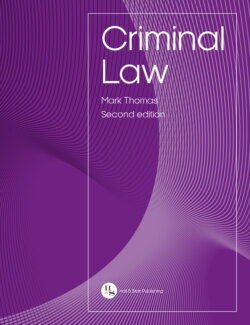Читать книгу Criminal Law - Mark Thomas - Страница 96
На сайте Литреса книга снята с продажи.
2.6.5Can an individual be ‘released’ from his duty?
ОглавлениеWhether an individual can be ‘released’ from his duty is different from that of a ‘termination’ of duty. In the latter case, we are concerned with a situation where the duty to act has finished as a result of the completion of a certain act or after a certain time period. For example, the statutory duty under s 1 of the Children and Young Persons Act 1933 is terminated upon the child reaching 16. Some other examples may assist with this idea of ‘termination’:
•During the school day, the individual teachers have a duty to act in relation to their pupils. Out of school hours, however, their duty is terminated until it recommences the following day.
•Upon Jack placing his elderly mother into a care home, his duty towards her will have terminated. If his elderly mother were to return to his care, however, the duty would naturally recommence.
The idea of termination is not concrete. One may argue that a duty never terminates but, rather, is put ‘on hold’. One may also argue that there is no distinction between a ‘termination’ of duty and being ‘released’ from one’s duty. In both cases, the individual is no longer under a duty to act in certain circumstances.
It is contended, however, that the distinction lies in the manner of being released from a duty. Should a duty extinguish as a result of the passage of time, eg the end of employment or the completion of an act, this would amount to the ‘termination’ of a duty. A ‘release’, on the other hand, is concerned with the circumstances where the victim, orally or by conduct, voluntarily relieves an individual of his duty to act. In theory, this is useful distinction; in practice, however, it is unlikely to have any great effect.
In relation to being ‘released’ from one’s duty to act, we are concerned with two specific contexts.
